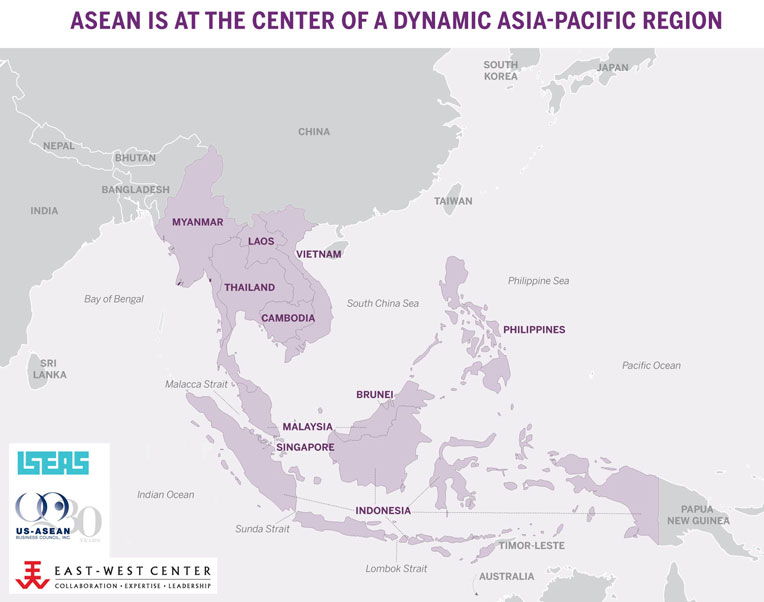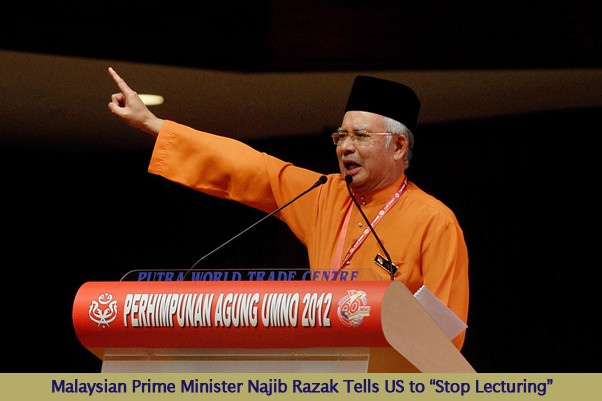FIRST IT WAS PHILIPPINE PRESIDENT Rodrigo Duterte who promised to break ties with the US and work with China and Russia (See Philippine President Tilts toward China and Russia).
Less than a week later Malaysian Prime Minister Najib Razak headed to China for a seven day visit ending November 6. As expected, on November 2, Najib joined the growing global chorus when he told the West to “‘stop lecturing’ as Malaysia embraces China”.
The week-long trip by Najib Razak marks another potential blow for Washington’s “pivot” toward Asia, two weeks after President Rodrigo Duterte of longtime US ally the Philippines used a visit to China to say it was “time to say goodbye to America”.
According to Asian political analyst Bridget Welsh.
“This is the new regional norm. Now China is implementing the power and the US is in retreat,” she said, adding Washington’s Asia pivot was “dead in the water”.
Najib is expected to sign at least ten trade agreements and a “significant defense deal” in a strategic shift toward China. Chinese corporations are already involved in Malaysia; recently they negotiated a $7 billion plan to develop a port in Malacca and are looking forward to building a high speed rail connecting Malaysia to the port city of Singapore.
Both the Philippines and Malaysia are members of the Association of Southeast Asian Nations (ASEAN). Formed in 1967 to facilitate cooperation and regional solidarity, ASEAN consists of ten Southeast Asian Countries having a population of 625 million and a combined economic output of nearly three trillion dollars. Brimming with such potential, in 2015 they formed the Asian Economic Community (AEC) to facilitate free movement of economic services, products, supplies and personnel across one of the world’s largest markets.

Brazil, Russia, India, China and South Africa have already formed a new global economic cooperative referred to as BRICS. With a combined population of nearly 4 billion people (half of the entire global population), BRICS nations generate roughly 23% of the gross world product and boast a combined GDP of $37 trillion with over $4 trillion in foreign reserves.
President Duterte of the Philippines has already clearly articulated his nation’s shift toward China and Russia. Now the Prime Minister of Malaysia seems to be moving in the same direction, it is fairly certain that the move will in some way involve the entire BRICS bloc adding to its continued growth and international economic and political clout.
Clearly, the ASEAN region is poised to be an economic and political battle zone pitting Western liberalism led by the US and the UK against the emerging BRICS alliance led by Russia and China.
As early as 1997 Malaysian Prime Minister Mahathir Mohamad manifested disdain for foreign investors operating behind the liberal shibboleth of “free market self interest” whose wealth he said, “must come from impoverishing others, from taking what others have in order to enrich themselves. Their weapon is their wealth against the poverty of others.”[1] He specifically pointed out leading liberal ideologue and ffinancier George Soros whom he said was
“..orchestrating Malaysia’s economic crisis—the PM announced to an assembled group of economists and bankers that “Mr. Soros’s ilk had to be stopped.”[2]
Realizing that the real source of a nation’s wealth is its natural resources and the human labor necessary to extract, transform, and improve them, the PM is opposed to easy money schemes, to usury, currency trading and the speculative derivative market. According to Mahathuir:
“I am saying that currency trading is unnecessary, unproductive and totally immoral. It should be stopped. It should be made illegal. We don’t need currency trading.”[3]
Quoting Pope Leo XIII, Mahathir said that “rapacious usury” is immoral. “It has precipitated economic decline and suffering throughout much of Asia and should be condemned.” [4]
In retaliation, Mr. Soros then called Mahathir a “menace to his own country.”[5]
Mahathir was ardently opposed to the IMF and allied International Banking System that instituted and then mandated neoliberal economic-political polices that drove third world nations around the world into economic and political dependency resulting in much of the unrest and animus toward the West being experienced today.
The World Bank/IMF system is no longer the only player on the block. Third world nations can now turn to BRICS and to other new financial institutions headed by China and Russia et al such as the Asian Infrastructure Investment Bank (AIIB), which are defending national sovereignty and national self determination and therefore offering grants and aid without political strings attached. Thus, it is not surprising that Malaysian Prime Minister Najib is opening his arms to the AIIB, which he sad represents anew beginning of
“…peaceful dialogue, not foreign intervention in sovereign states”.
Indicating his displeasure with the IMF and World bank, Najib stated that
It is hardly any wonder that third world nations fed up with ideological manipulation, paternalism, usury and financial exploitation are looking for alternatives and turning to Russia and China.
Western financial overlords are not going to take the ASEAN exit siting down. Already naval operations in the South Pacific are turning hot as the US has increased its naval presence and has proliferated military exercises while China protests the intrusion and is engages in joint naval operations and exercises with Russia. Western agents operating in the Philippines have apparently already swung into full gear facilitating protests against Duterte for his turn toward China. The Philippines has become a hot-spot, a place where unrest is easily predictable despite the fact that Duterte has an 86% approval raring among Philippians.
Recognizing the trend and the destabilizing effect of foreign agents employed by non-governmental organizations (NGOs) operating in places if vital interest to US foreign policy. Mathew Maavak representing Risk Foresight at the Universiti Teknologi Malaysia (UTM) comments:
“NGOs and the West-friendly media constitute a major subsidiary of the global social revolutions enterprise. Together, they seek out, identify and amplify public discontent in nations not aligned to the United States.”
“To the agitprop entrepreneur, the returns on revolutionary investments are immense.”[6]
Tony Cartalucci writing for New Eastern Outlook, confirms the covert operations of foreign agents, operations which are no longer clandestine – everyone knows about them.:
“It is becoming clear that US influence – despite its “pivot toward Asia” – is waning across the Asia Pacific region. Washington has suffered geopolitical setbacks in virtually every nation in Asia Pacific, including those now led by regimes it has meticulously organized, funded, and backed for decades. It is also waning, however, among those nations considered long-time and crucial US allies”
“Asia has for decades been made to “cave” to Washington’s every whim. It should be no surprise that a newspaper founded by a former US intelligence officer and funded by the US State Department would exhibit in its editorial pages the same sort of shameless exceptionalism that the US itself exhibits upon the international stage.”
The United States must rethink its foreign policy and find the political strength to reign in Wall Street and bring rapacious usury under control before it finds the entire world turned against it. The signs of the times indicate a clear trend against liberalism in the guise of friendly liberty, equality and fraternity. Equality went out with socialism, Liberty has reared her ugly head and everyone knows what a “fraternity is” and who it benefits. Amid a growing clamor for justice, morality and charity, developing nations around the world are increasingly turning to Russia. This is surprising only to those who lack a theopolitical perspective. It is not surprising to those who expect an “Era of Peace” and know it is associated with the conversion of Russia.
Peace is coming with our cooperation or without. The United States needs leadership that will align it with Divine Providence and cease working against it.
________________________
NOTES
[1] Edward A. Gargan, (1997) “Premier of Malaysia Spars With Currency Dealer,” New York Times, September 22.
[2] Ibid
[3] Ibid
[4] http://www.veteranstoday.com/2016/10/30/george-soros-wants-to-create-color-revolution-in-southeast-asia/#_ftn4
[5] Gargan, “Premier of Malaysia Spars With Currency Dealer,” NY Times, September 22, 1997.
[6] https://sputniknews.com/politics/201610281046843489-soros-wikileaks-malaysia-leak/







